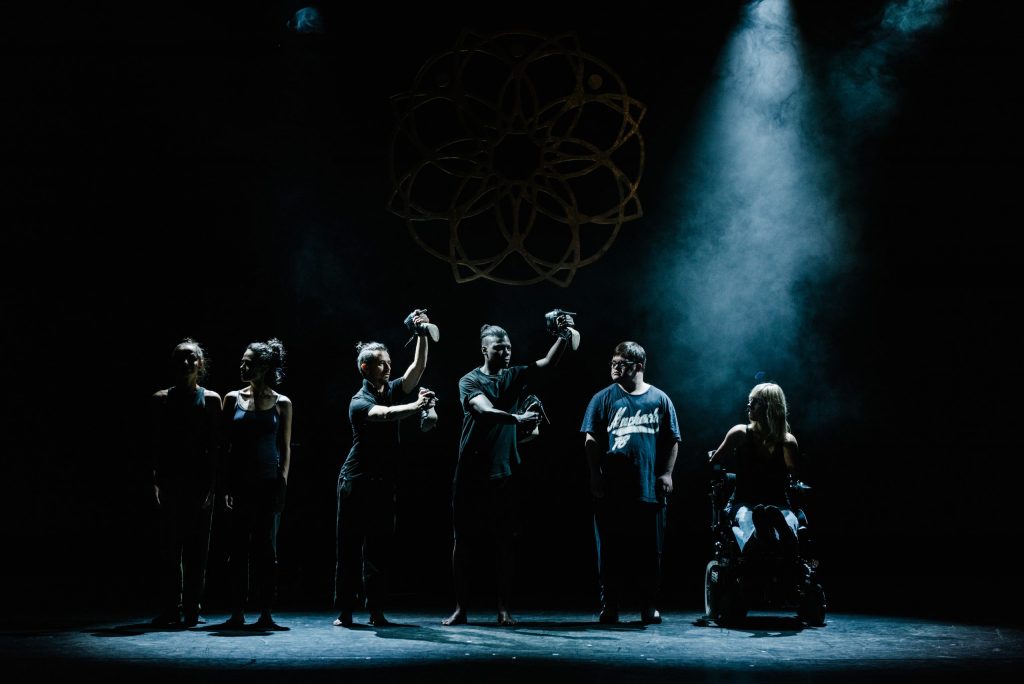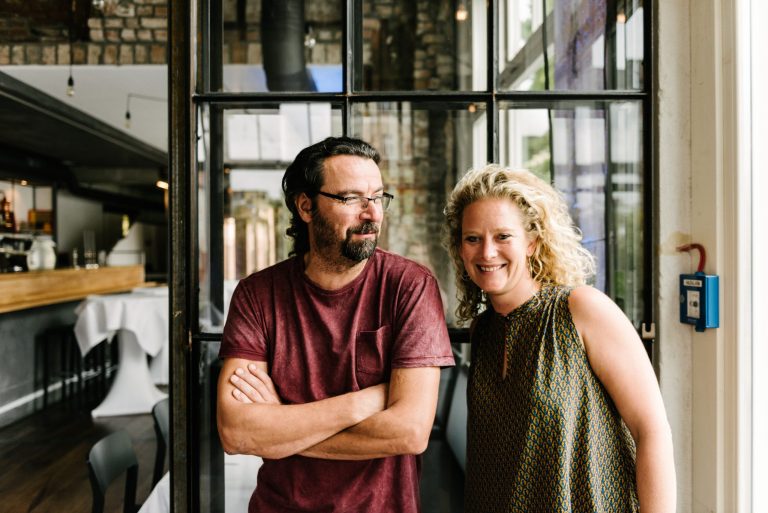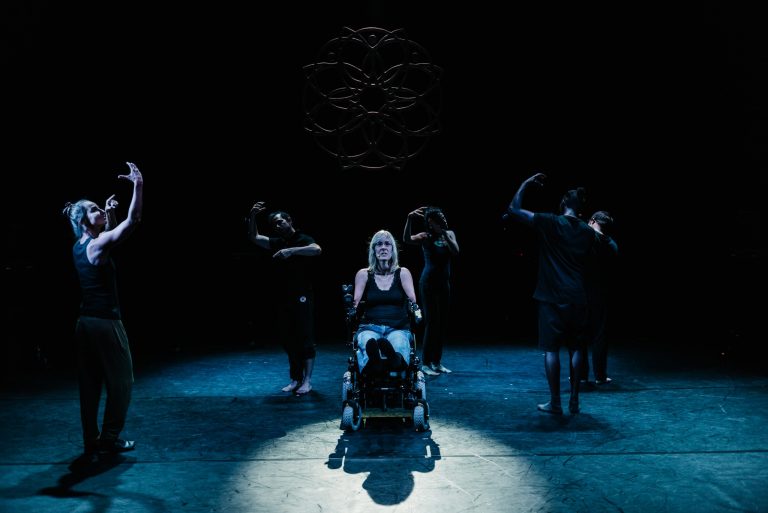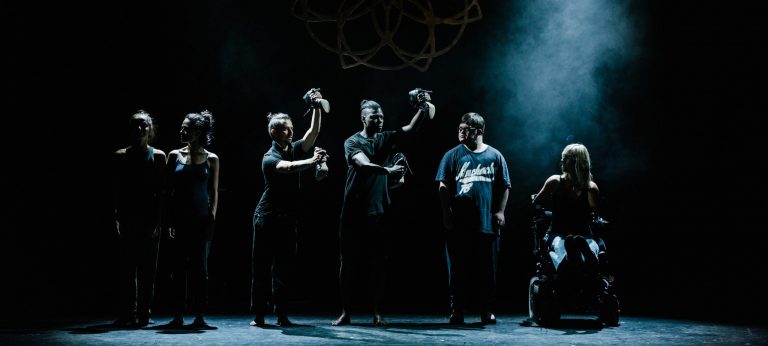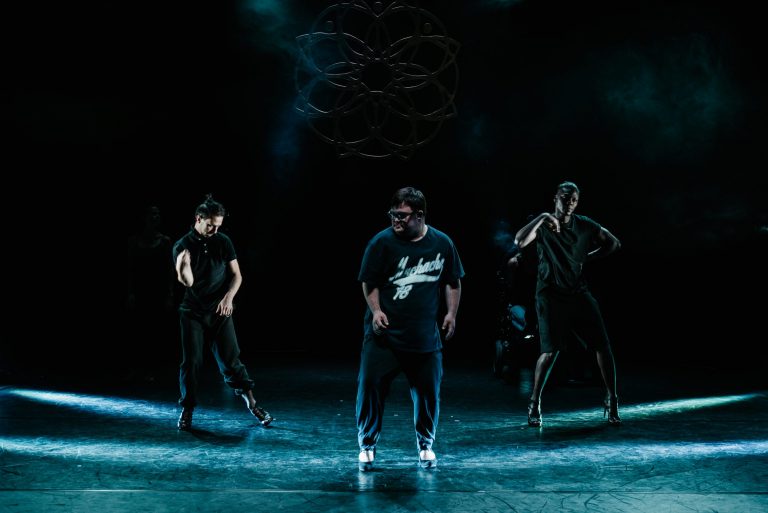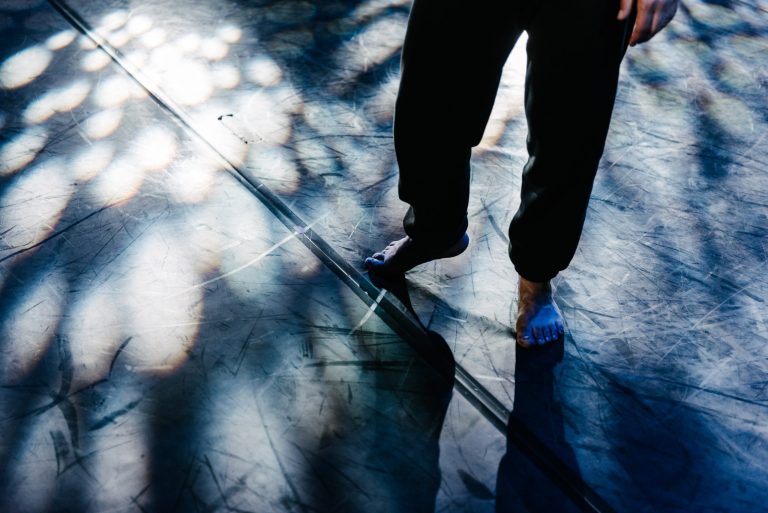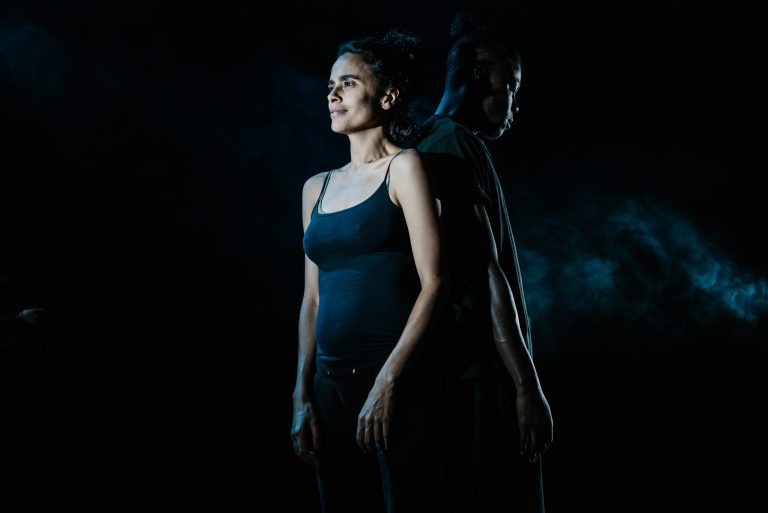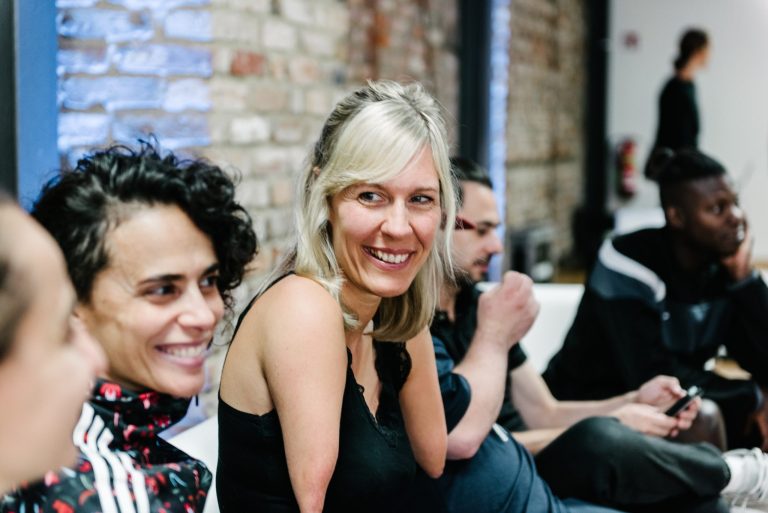Un-Label by Sommertheater Pusteblume e.V.
The interdisciplinary, mixed-abled Performing Arts Company Un-Label stands for artistic innovation and diversity while questioning established concepts of body, space, and society. The performing arts are used as a medium to break down labels, boundaries, and prejudices. Un-Label places emphasis on issues such as feminism, immigration, and inclusion and has a primary focus is on the integration of people with mental and physical handicaps. This performing arts company uses symposia, research projects, and summits to network international actors and academics in the cultural landscape as well as to promote talent via inclusive workshop series and master classes. Their network spans the whole of Europe.
Report on Un-Label.
Diversity, next level
Spotlights are bathing the stage in a cool blueish light. In the rows of audience chairs, a director and a lighting engineer are sitting behind large-size monitors; on the stage and in front of it, one can find deaf persons, physically and mentally disabled people, blacks, whites, Germans, Greeks. That the theater group rehearsing this afternoon at Berlin’s Pfefferberg Theater is not a usual one is becoming obvious very soon.
The performance artists, actors, and singers are part of the cultural project Un-Label, and its name marks the objective: by means of the performing arts, labels, boundaries, and biases are to be reduced, and not only vis-à-vis any specific group of persons. Questions of feminism are just as significant as migration and inclusion are. The integration of mentally and physically disabled persons is one of the great concerns of Lisette Reuter, who manages the project. “In the cultural scene in Germany, professionalism is oftentimes equated with completed education. These people have no access to that. Despite this, we work with them on a professional level.”
Reuter works closely with the director Costas Lamproulis. Cooperating with the roughly 100 artists participating in Un-Label – some more, some less closely –, they develop concepts for performances and workshops that will then be held in Germany, Turkey, or Greece. The project’s network extends all over Europe.
The performance to be given by Un-Label at Berlin’s Pfefferberg Theater as part of a gala event on the day following the rehearsal will be a mix of song, sign language, and dance that is wild and consistent alike. Turning the most different types of characters and impairments into a functioning group of artists is “the most difficult and, at the same time, the most rewarding task” as part of his work, says Costas Lamproulis. “Difference is at the core of the entire project, and empowers us. Body, language, cultural and artistic background – all these are different in each of us. That’s what we stand for.”
“We are convinced that diversity enriches art.”
First and foremost, it takes time to turn people into self-confident artists able to hold their own on stage, who because of their origins, body, or mental impairment have met all their lives with resistance and obstacles. “In addition, lots of things here are based on trust and freedom. What counts for us is that everyone can develop further artistically. You will have to leave sufficient space for that. For our group, nothing is specified by directors or chorographers but everything will be worked out within the group.”
The confidence makes itself felt during the experience of the group in the course of the rehearsal. Errors are allowed, and sometimes even desired. And, anyway: being different, and having divergent opinions, will not be an obstacle but rather an important resource. Reuter says: “We are convinced that diversity enriches art. All have different perceptions of society, of life. This is also reflected in our work.”
Despite all the liberties offered by a laissez-faire policy: rehearsals are done in a focused manner, and the break will be exactly five minutes, which cannot even be changed upon dancer Tom Auweiler’s request that the time of the break be doubled. Reuter’s ability to hold the Un-Label construct together as well as she does is probably due to her past as a cultural manager.
She and Costas Lamproulis, who took a course as a film director and has ended up at the theater, are a well-coordinated team. It is nine years now that they have been working jointly on projects that are similar primarily because of their differences. “We do not fit into any category; that is our big problem. In Germany, we are labeled as ‘social’ by art promoters, whereas social promoters classify us as ‘art’. If you then start working in an intercultural and interdisciplinary fashion, people will no longer know where to put you.” In almost no time, Un-Label has successfully liberated itself from all existing labels and categorizations. This is now doing the project harm in some places, particularly where it’s all about the acquisition of grants.
In 2015, Reuter and Lamproulis began to devise workshops jointly with a group of artists. 16 of these artists are now an integral part of the projects, with some of them being on stage at the Pfefferberg Theater. Since its foundation some two years ago, Un-Label has become a definite authority in the world of inclusive performance art in Europe. The initiative’s message tends to spread rapidly.
“Un-Label has something of a snowball effect. When we were on tour in Turkey, our coach driver was the type of grim guy that everybody knows. After a few days, he had completely warmed toward us, saying to our Turkish colleagues: “If everybody were like you, then there would be no wars in the world. Our group’s appearance must have turned something in his head. To me, our mission is also a very political one. Everybody who gets in contact with us in some way will have that ‘click’ experience. We try to change and open up society.”
The market leader in inclusion
It’s stories like that which motivate the entire team – all directors, actors, dancers, singers, and lighting engineers – to carry on. Costas Lamproulis says: “There have been many difficult moments but I’ve never gotten to a point where I would have said, now that’s it.” For people with disablements, it was more difficult. Quite a few times, there were artists coming to him to tell him that a few days ago, they were just about to leave. Most of all, they wanted to say Thanks for the power they derived from the project, which was why they were ultimately staying on. “These moments are a great motivation for us”, says Lamproulis.
Lisette Reuter likes to speak of the “Company” Un-Label, and thus it may be quite correct to use economic terms by describing the project as the market leader in the niche of the inclusive performing arts. Projects that work both interculturally and inclusively do exist. Projects combining both are very hard to find. “We are rather unique after all.”
Interview with Un-Label
We interviewed last year’s winner Un-Label. They reveal why it makes sense to apply to The Power of the Arts and talk about the kinds of wishes that can be fulfilled with the award.
The Power of the Arts gave us the opportunity to further build and expand the Un-label Performing Arts Company. The following activities are currently in the pipeline:
On 1 February 2018, the new 28-month Un-Label project ImPArt – Performing Arts in Artistic- Aesthetic Advancement for a Barrier-Free, Participation-Oriented Society has started. ImPArt explores the direct integration of barrier-free performance methods in the arts. The focus is on the potential of participation of and for all humans regarding artistic aspects. Freedom from barriers requires looking for new methods in performing arts. Especially because people with disabilities are often deprived of the atmospheric and artistic experience through the parallel portrayal of the visible and the audible. ImPArt is redefining what it means to be free from barriers. It is a source of inspiration for experimenting with new possibilities, thereby creating innovation in the arts.
From April 2018, we started to offer regular training opportunities for artists across all fields, both with and without disabilities. Every other month, there is a chance to join master classes with renowned figures on the scene and travel down new paths in the performing arts. Professional training sessions explore, bind, and redevelop the boundaries of the arts, the body, and creativity. Thus, artists can enhance their performance talents and cultural horizons while receiving support in their professionalization.
Beginning of May, our Creative Exchange and Artistic Development Summit took place. A selection of experienced national and international artists and experts from the field of inclusive visual arts had been invited to Germany. Successful barrier-free practices were presented and tried. The objective was to develop new possibilities together and promote mutual competence advancement.
Furthermore, the international symposium ALL IN – Aesthetics and Methods of Inclusive Cultural Work was held in cooperation with ibk at Cologne’s Sommerblut Festival.
There are also plans to expand our productions in the form of a diverse, inclusive performance at a high artistic level, which is planned to be developed and produced in co-production with the Pfefferberg Theater in Berlin.
Additionally, we are working to professionalize our PR materials and communication strategy. Currently, a new barrier-free, bi-lingual website is being programmed which represents the Un-Label Performing Arts Company. The website will hopefully go live in May. Additionally, we are working with professionals on a social media strategy. Our graphic designers are currently working on a corporate identity and marketing concept. That includes the creation of image brochures, postcards, flyers, posters, etc.
All of the winners of The Power of the Arts presented really exciting ideas and creative concepts on the evening of the award ceremony. The artists from Un-Label quickly came into contact with Banda Internationale, for the idea also popped up to potentially work together in Dresden. We also quickly came into conversation with the initiators of label m, not lastly due to the similar name. We had a pleasant exchange and were happy to get caught up in the gushing excitement among the group’s young winners. The contact and exchange of ideas with Banda Internationale and label m was motivating and left an impression, mostly because we had similar synergies and quickly got onto the same page.
We wanted to expand upon our successful pioneering work, which started with the EU Creative Europe project Un-Label, by founding the Un-Label Performing Arts Company. With the company, we are looking to anchor sustainable inclusive activities in cultural programming. Furthermore, we want to use our wide range of programs to counter the gaps in cultural offerings with the objective of facilitating new paths in equal opportunity participation for artists and audiences alike, to manifest improvement and added value in skills, and to optimize career and vocational perspectives.
It was the award from The Power of the Arts that made that possible in the first place, enabling us to start this professional advancement.
We believe that art is a constant search for identity. By redefining our truths, our needs, our convictions, and our perceptions, we are continuously redefining our position and our perspectives for the space we live in. By shaping new customs, we are recognizing new norms in order to question them anew. Art doesn’t want to be discriminated against or outcast by others, but rather be integrated, because being different is an integral component to the act of creation.
In an era where our society is unable to integrate all of its members, interculturalism and inclusion in the arts is not an option, it’s a necessity.
That makes The Power of the Arts an even more relevant opportunity for people in art and culture active in the intercultural / inclusive field to apply, for unfortunately there are hardly any other initiatives supporting this important topic in such a professional manner. Accordingly, the concept won us over at first sight.

